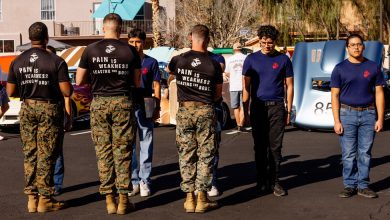Justus Rosenberg, Beloved Professor With a Heroic Past, Dies at 100

For nearly 60 years, Justus Rosenberg was a beloved literature professor at Bard College. Clad in his familiar tweed jacket, he taught French, German and Russian classics and was known for popular courses like “10 Plays That Shook the World.”
But on Bard’s leafy campus in Annandale-on-Hudson, N.Y., Mr. Rosenberg also represented a remarkable living link to Holocaust history.
As a teenager in World War II, he served as a courier in the fabled rescue team of Varian Fry, an American journalist who launched a covert operation that provided safe passage to artists and intellectuals out of Vichy France. The mission aided luminaries like Hannah Arendt, Marcel Duchamp, Marc Chagall, Max Ernst and André Breton.
Mr. Rosenberg then fought in the French Resistance, lobbing grenades at German tanks, and aided the U.S. Army as a reconnaissance scout, earning a Bronze Star. He also received the Purple Heart: a jeep in which he was riding hit a land mine, badly wounding him and killing the soldier who had taken his usual seat.
He died at 100 on Oct. 30 at his home in Rhinebeck, N.Y. His wife, Karin, confirmed the death.
Sometimes Mr. Rosenberg’s students prodded him about the past, eager to learn about his heroics during the war, but he preferred to focus on the present. However, if they persisted, and he was in a storytelling mood, he might perch on a classroom table and tell his tale.
The story starts in 1921, when Mr. Rosenberg was born to a prosperous Jewish family in the Free City of Danzig (now Gdansk, Poland). When the Nazis rose to power in the 1930s, anti-Semitism spread through his homeland. At school his friends began to avoid him; he witnessed a mob destroying Jewish businesses in his neighborhood. When he was 16, his parents sent him to study in Paris, not realizing that they wouldn’t see him again for 15 years.
After the Nazis invaded Poland in 1939, Mr. Rosenberg lost contact with his family. A year later, they also took Paris, and he fled the city with thousands of others on roads filled with people pushing their possessions in wheelbarrows.
When he ended up in Toulouse, fate was waiting for him.
He found refuge there in a cinema that had been converted into a rest stop, with straw bags laid across its floors. Settling in for the night, he met an American student named Miriam Davenport, who took a keen interest in him. She encouraged him to follow her to Marseille, and when he did, she offered him an unexpected assignment.
“Gussie,” she told him, “I’ve got a job for you.”
Ms. Davenport had recently rendezvoused with Varian Fry, who was sent to Europe by the Emergency Rescue Committee, a group of New York intellectuals who wanted to help cultural figures stranded in Vichy France.
Mr. Fry arrived with a list of names and Eleanor Roosevelt’s blessing. His operation became one of the most successful private U.S. rescue missions of World War II, saving some 2,000 people, and he is remembered by Holocaust historians as the American Schindler.
But before any of that happened, Mr. Fry needed a courier he could trust to deliver messages and fake documents across Marseille, which had become a port city of desperation, swarming with refugees trying to flee the country. Ms. Davenport told him about the young Mr. Rosenberg, who was “Aryan-looking” and spoke French. Mr. Fry quickly enlisted him.
“I looked very blond, very Germanic and younger than my own age, so I wouldn’t be stopped often to be asked for papers because I looked so innocent and angelic,” Mr. Rosenberg said in an interview with the International Rescue Committee. “I was really unaware of the danger. To me, it was something that was adventurous in many ways, somewhat romantic too.”
Mr. Rosenberg was dispatched to buy passports on the black market, scout escape routes and find safe hiding places for refugees. When he worked with the team’s master document forger, he became convinced that he recognized him, and he was right: It was the same man who drew caricatures down by the harbor for 10 francs a pop.
Mr. Rosenberg also accompanied Mr. Fry’s illustrious charges across the Pyrenees into Spain, which often accepted refugees who made the crossing without an exit visa. He once shepherded the writers Heinrich Mann and Franz Werfel, who traveled with their wives. (Werfel’s wife, Alma, was Gustav Mahler’s widow.) As he guided them, he befriended Mann’s wife, Nelly, who brought out a flask of brandy for him to sip on as they marched across the range.
Mr. Fry’s operation ended in 1941.
Marseille’s refugee crisis had grown dire, and Mr. Fry was forced to leave France after his clandestine initiative finally ran afoul of the Vichy government. Mr. Rosenberg’s protection vanished, and he was left to fend for himself. He was soon rounded up with others and sent to a transit camp outside Lyon. A guard divulged that they were being transferred to a camp in Poland.
“I knew a labor camp in Poland wasn’t good,” Mr. Rosenberg said. “I knew I had to find a way not to go.”
A fellow internee was a medical student. He asked her what illness might necessitate admission into a hospital, and she said peritonitis. He interrogated her about the symptoms.
Biding his time until enough guards were nearby, Mr. Rosenberg commenced a performance of writhing and moaning. He was taken to the infirmary, where he rubbed a thermometer until it registered a fever. When he next awoke, he was missing his appendix. He also learned that he was going to Poland anyway.
He pleaded with a nurse to let him mail a letter.
Mr. Rosenberg’s message, as he had hoped, found its way to a secret network of priests connected to the Resistance. A rebel priest soon visited the hospital, concealed a parcel of clothes for him behind a toilet and parked a bicycle beneath a window. Mr. Rosenberg then darted off on it, blood leaking from his belly.
After he healed, Mr. Rosenberg joined the Resistance. He was given the identity of Jean-Paul Guiton, an orphan born to a city whose town hall and birth records had been destroyed. He helped retrieve airdrops of weapons from the British and spied on Nazi troops to collect military intelligence. He also joined a guerrilla unit, ambushing and firing on German convoys.
After D-Day, he fought alongside Americans, and he was assigned to the Army’s 636th Tank Destroyer Battalion. He aided them as a guide and interrogated prisoners in German. When the war ended, he became an officer at a displaced persons camp operated by the United Nations.
Mr. Rosenberg returned to Paris to study literature at the Sorbonne and immigrated to America with a preferential visa in 1946. He earned his doctorate at the University of Cincinnati, joined Bard’s faculty in 1962 and also taught courses at the New School for over 50 years.
After settling in America, Mr. Rosenberg wrote Miriam Davenport a letter to tell her that he was alive. She quickly wrote him back.
“You were a symbol of sorts, to me, in those days,” she wrote. “Everyone was moving heaven and earth to save famous men, anti-fascist intellectuals, etc. And there were you, a nice, intelligent youngster with no family, no money, no influence, no hope, no fascinating past.”
Justus Rosenberg was born on Jan. 23, 1921. His father, Jacob, was a businessman. His mother, Bluma (Solarski) Rosenberg, was a homemaker. In the 1950s, he reunited with his family.
He married Karin Kraft in 1997. She is his only immediate survivor.
For decades, Mr. Rosenberg kept the stories of his past to himself.
When he was interviewed in 1998 by the Shoah Foundation, which Steven Spielberg had established to collect the testimonies of Holocaust survivors, he discussed his wartime exploits extensively for the first time.
At the age of 96, Mr. Rosenberg was decorated by the French government as a commander of the Legion of Honor for his service in World War II. Last year he published a memoir, “The Art of Resistance: My Four Years in the French Underground.”
Karin Rosenberg, who first met her husband in the 1980s, knew nothing of his valiance for years.
“When he finally talked about it, I asked, ‘Why didn’t you tell me?’ and he told me, ‘Oh, I just didn’t want to brag about it,’” she said. “We went to France on vacation once and he showed me where it all happened. Where he hid in the mountains. A little town where an old man still remembered him from when he lived there with a strange name.”
“I believe he was a hero,” she added. “But he did not think of himself as a hero. To him, he was just doing what needed to be done.”





